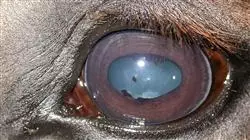University certificate
The world's largest faculty of veterinary medicine”
Description
The most complete and updated program in Infrequent Equine Hospital Pathologies in the online educational market"

In the case of neurological diseases, injury localization is the cornerstone of the diagnostic process. The possibilities of diagnostic imaging are becoming more and more advanced, but require specific facilities and specialized knowledge for their interpretation. In the case of neuromuscular diseases, anatomopathological diagnosis is crucial in most of them, along with analytical alterations.
Hospital treatment of neurological pathologies is based on a common generic treatment of stabilization and support combined with specific treatments depending on the etiology. It is of special importance the intensive care that the horse that is in decubitus due to one of these pathologies must receive, since the possible complications are serious and frequent. Supportive hospital treatment is also common to most myopathies, with renal protection and stabilization of electrolyte disorders, that frequently appear in these pathologies, being essential. Post-hospitalization changes in management, nutrition and exercise are a very important part of the medical therapy, as well as its regular monitoring to avoid relapses.
The doctor should know the prevalence of the different neurological diseases according to the neuro-localization suggested by the symptoms and be able to develop a list of relevant differential diagnoses. The same is true for muscular pathologies where the prevalence is closely related to breed and sporting disciplines.
Endocrine therapies are very diverse and, at the same time, specific to the pathology, but one of their successes consists of continuous monitoring of patients in order to adjust the established therapeutic doses. In this module, we will study how in many cases the hospitalization of these patients facilitates the diagnosis by dynamic methods and the adequacy of treatments.
Dermatological Diseases represent one of the main causes of consultation in equine clinics. The first section provides a diagnostic approach to horses with skin problems, as well as the main diagnostic methods.
Join the elite, with this highly effective educational training and open new paths to help you advance in your professional progress"
This postgraduate diploma in Infrequent Equine Hospital Pathologies contains the most complete and up-to-date scientific program on the market. The most important features include:
- The latest technology in online teaching software
- A highly visual teaching system, supported by graphic and schematic contents that are easy to assimilate and understand
- Practical cases presented by practising experts
- State-of-the-art interactive video systems
- Teaching supported by telepractice
- Continuous updating and recycling systems
- Autonomous learning: full compatibility with other occupations
- Practical exercises for self-evaluation and learning verification
- Support groups and educational synergies: questions to the expert, debate and knowledge forums
- Communication with the teacher and individual reflection work
- Content that is accessible from any fixed or portable device with an Internet connection
- Supplementary documentation databases are permanently available, even after finishing the course
A complete educational program that will allow you to acquire the most advanced knowledge in all the areas of intervention of the equine veterinarian"
TECH teaching staff is made up of professionals from different fields related to this specialty. In this way TECH ensures that it delivers the educational up-to-date objectives that it aims for. A multidisciplinary team of professionals, experienced in different fields, will develop the theoretical knowledge in an efficient manner, but, above all, will provide students with practical knowledge based on their own experience: one of the differential qualities of this program.
This mastery of the subject matter is complemented by the effectiveness of the methodological design. Developed by a multidisciplinary team of e-Learning experts, it integrates the latest advances in educational technology. This way, you will be able to study with a range of comfortable and versatile multimedia tools that will give you the operability you need during the program.
The design of this scientific program is based on Problem-Based Learning: an approach that views learning as a highly practical process. To achieve this remotely, telepractice will be used: with the help of an innovative interactive video system and Learning from an Expert, students will be able to acquire knowledge and skills as if they were facing the scenario they are learning at that moment. A concept that will make it possible to integrate and fix learning in a more realistic and permanent way.
With the experience of working professionals and the analysis of real success stories, in a high-impact training approach"

With a methodological design based on proven teaching techniques, this innovative course will take you through different teaching approaches to allow you to learn in a dynamic and effective way"
Objectives
The objective is to train highly qualified professionals for work experience. An objective that is complemented, moreover, in a global manner, by promoting human development that lays the foundations for a better society. This objective is materialized in helping professionals to reach a much higher level of competence and control. A goal that, in just a few months, can be achieved with high intensity and effective instruction.

If your objective is to broaden your skillset to open up new roads to success and development, this is the place for you: a program that aspires to excellence"
General Objectives
- Review the detailed neurological examination procedure to ensure anatomical localization of injuries
- Compile diagnostic methods specific to the neurological system
- Provide the basis for the evaluation, monitoring and treatment of hospitalized neurological patients
- Describe the diagnosis and treatment of the main neurological pathologies most commonly seen in hospitalized horses
- Describe the diagnosis and treatment of the main muscular pathologies that can be observed in hospitalized horses
- Be familiar with the most frequent endocrine disorders in equine patients
- Differentiate the existing diagnostic methods for the most common endocrine pathologies, addressing the fact that some of these methods are dynamic and require hospitalization for serial sampling
- Provide an in-depth knowledge of the most common dermatological problems
- Identify all clinical signs associated with each dermatological disease
- Establish the specific clinical approach for each pathology and determine the prognosis and the most appropriate treatment for each skin disease
- Determine the main causes of intoxication and their involvement in different systems
- Establish an appropriate approach and methodology for ophthalmologic evaluation
- Identify the clinical signs of ocular pathologies
- Provide an in-depth knowledge of parasitosis in equids
- Differentiate a clinical approach in the geriatric patient and in donkeys
- Generate specialized knowledge of the correct diagnosis, treatment and management of infectious and/or notifiable diseases
Specific Objectives
Module 1. Neurological and Muscular Problems in Hospitalized Patients
- Describe all the components of the diagnostic process in neurological diseases, from the pertinent anamnesis and injury localization to advanced imaging techniques
- Analyze available diagnostic techniques and discuss their uses and limitations
- Update new trends in the treatment of neurological horses, from common strategies to the management of decubitus horses
- Detail the characteristics and prevalence of the different neurological diseases and their differential diagnoses
- Describe all components of the diagnostic process, from physical examination to advanced pathological diagnostic techniques
- Detail exercise-related muscle diseases and establish appropriate medical treatments and management therapies
- Detail non-exercise related muscle diseases and establish appropriate medical treatments and management therapies
Module 2. Endocrine System Disorders Hospitalization of Horses with Dermatological Problems
- Recognize the main endocrine problems, as well as the static and dynamic diagnostic methods for each of them
- Establish the appropriate medical stabilization therapies for endocrine problems and how to adjust them according to the evolution of the disease
- Determine adequate nutrition in patients with endocrine problems, as well as obesity control in animals with metabolic syndrome
- Identify the main pathologies affecting the skin in equids
- Examine the etiology, clinical and laboratory signs, and establish the prognosis of the main dermatological diseases in horses
- Determine the symptoms of bacterial and viral skin diseases and propose treatment options
- Identify the symptoms of skin diseases of fungal and parasitic origin and propose treatment options
Module 3. Poisoning. Ophthalmic Pathologies. Equine Parasitosis. Donkey Medicine. Hospitalization and Medicine in Geriatric Patients
- Determine the symptoms of allergic and immune-mediated skin diseases and propose treatment options
- Identify the symptoms of other skin diseases such as vasculitis and nutritional disorders that are reflected in the skin
- Analyze the origin of intoxications and their involvement in the gastrointestinal, nervous, cardiovascular, lymphatic, hepatic and urinary systems
- Recognize the clinical signs of intoxications related to body condition, skeletal system and epithelium
- Establish work and evaluation methodology for patients with ophthalmic pathologies
- Examine the methodology for the implementation of treatment systems and their management in hospitals
- Gain in-depth knowledge of ophthalmologic evaluation, identification of ocular pathologies and their treatment and hospital management
- Determine the parasites involved in respiratory and gastrointestinal pathologies
- Establish the different treatments for equine parasites
- Examine endocrine pathologies and their particularities in the treatment of donkeys
- Establish an appropriate approach to the geriatric patient
- Examine the most common notifiable diseases and their diagnosis, as well as the management and control of infectious diseases

A path to achieve knowledge and professional growth that will propel you towards a greater level of competitiveness in the employment market"
Postgraduate Diploma in Equine Hospital Pathologies Less Frequent
.
At TECH Global University, we present you our Postgraduate Diploma in Equine Hospital Pathologies Less Frequent program, designed especially for veterinarians who wish to expand their knowledge and excel in the care of horses. Join us and acquire the necessary skills to face the most complex challenges in equine medicine. This postgraduate course is taught through online classes, giving you the flexibility and convenience of studying from anywhere, anytime. Take advantage of the cutting-edge technology we use in our virtual platforms to access quality content and engage in real-time interactions with leading professionals in the field of equine medicine. By choosing our academic program, you will benefit from comprehensive and up-to-date training. We focus on providing you with the most advanced knowledge of the less common pathologies that can affect horses in hospital settings. Through real-world case studies and detailed analysis, you'll learn how to diagnose and treat complex conditions that require a specialized approach.
We'll help you learn how to diagnose and treat complex conditions that require a specialized approach.
Title yourself as an expert in equine veterinary medicine
.
Our faculty is comprised of recognized experts in the field of equine medicine who will share their experience and expertise with passion and dedication. You will gain a unique perspective on less common pathologies and develop practical skills that will enable you to provide quality care and improve the health and well-being of horses. Plus, by choosing our online classes, you'll have the opportunity to network with other equine medical professionals from around the world. You'll be able to exchange ideas, discuss clinical cases and establish a valuable network of contacts that will open doors in your career. If you're ready to take your career in equine medicine to the next level, look no further. Join TECH Global University and become an expert in less common equine hospital pathologies. Boost your knowledge, broaden your horizons and make a significant difference in equine health - start your academic journey with us today!







